初中英语 一般过去式 与现在完成式
2020中考英语语法:现在完成时与一般过去时的区别
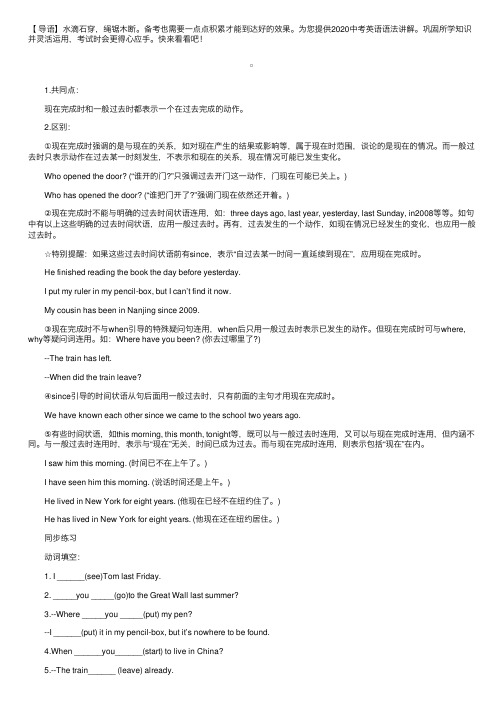
【导语】⽔滴⽯穿,绳锯⽊断。
备考也需要⼀点点积累才能到达好的效果。
为您提供2020中考英语语法讲解。
巩固所学知识并灵活运⽤,考试时会更得⼼应⼿。
快来看看吧! 1.共同点: 现在完成时和⼀般过去时都表⽰⼀个在过去完成的动作。
2.区别: ①现在完成时强调的是与现在的关系,如对现在产⽣的结果或影响等,属于现在时范围,谈论的是现在的情况。
⽽⼀般过去时只表⽰动作在过去某⼀时刻发⽣,不表⽰和现在的关系,现在情况可能已发⽣变化。
Who opened the door? (“谁开的门?”只强调过去开门这⼀动作,门现在可能已关上。
) Who has opened the door? (“谁把门开了?”强调门现在依然还开着。
) ②现在完成时不能与明确的过去时间状语连⽤,如:three days ago, last year, yesterday, last Sunday, in2008等等。
如句中有以上这些明确的过去时间状语,应⽤⼀般过去时。
再有,过去发⽣的⼀个动作,如现在情况已经发⽣的变化,也应⽤⼀般过去时。
☆特别提醒:如果这些过去时间状语前有since,表⽰“⾃过去某⼀时间⼀直延续到现在”,应⽤现在完成时。
He finished reading the book the day before yesterday. I put my ruler in my pencil-box, but I can’t find it now. My cousin has been in Nanjing since 2009. ③现在完成时不与when引导的特殊疑问句连⽤,when后只⽤⼀般过去时表⽰已发⽣的动作。
但现在完成时可与where, why等疑问词连⽤。
如:Where have you been? (你去过哪⾥了?) --The train has left. --When did the train leave? ④since引导的时间状语从句后⾯⽤⼀般过去时,只有前⾯的主句才⽤现在完成时。
中考英语--一般过去时和现在完成时的区别

中考英语--一般过去时和现在完成时的区别一. 一般过去时用法:表示过去发生的动作或者存在的状态。
例:I drunk a lot of tea last night.我昨天晚上喝了很多茶。
(喝了很多茶这件事发生在昨天晚上,已经结束了。
)这个动作,表示在时间轴上,可以参考下图:I ran my bike to go to school when I was in middle school.我上中学的时候,每天骑自行车去学校。
(骑自行车上学这件事发生在我上中学这个时间段内,现在已经不这样了。
)二. 现在完成时用法1. 表示过去发生的动作对现在的影响。
例:Would you like a cup of tea?你要来一杯茶吗?I have drunk a lot of tea by now.我到目前为止已经喝了很多茶了。
(喝茶这个动作发生在过去,对现在的影响是我已经喝够了。
——言外之意,你再请我喝茶我就不喝了。
)这个动作,表示在时间轴上,可以参考下图:用法2.表示动作发生在过去,持续到现在,且有可能继续持续下去。
例:I like tea very much.我很喜欢喝茶。
I have drunk different kinds of tea by now.我到现在为止喝过好多种类的茶了。
(基于前文给出的背景,可以得知,我喝茶这个动作开始于过去,一直持续到现在,并且很可能以后还会继续喝不同种类的茶。
)我们来对比上面所给出的例句,会发现这样两点不同:1. 一般过去时,时间状语往往很明确,就是具体的过去某个时间。
现在完成时,时间状语往往比较含糊,没有给出明确具体的时间。
2. 一般过去时,动作或者状态在过去某个时间已经结束了,和现在没有一点关系。
现在完成时,动作是发生于过去,和现在有密切联系。
一般过去式与现在完成时的区别
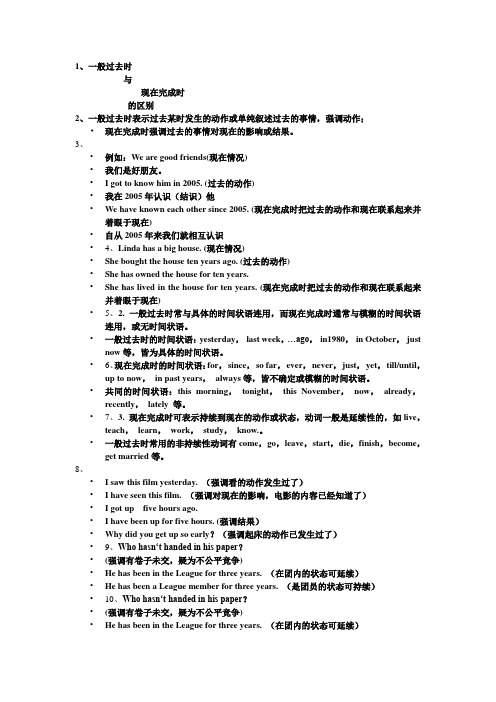
1、一般过去时与现在完成时的区别2、一般过去时表示过去某时发生的动作或单纯叙述过去的事情,强调动作;•现在完成时强调过去的事情对现在的影响或结果。
3、•例如:We are good friends(现在情况)•我们是好朋友。
•I got to know him in 2005. (过去的动作)•我在2005年认识(结识)他•We have known each other since 2005. (现在完成时把过去的动作和现在联系起来并着眼于现在)•自从2005年来我们就相互认识•4、Linda has a big house. (现在情况)•She bought the house ten years ago. (过去的动作)•She has owned the house for ten years.•She has lived in the house for ten years. (现在完成时把过去的动作和现在联系起来并着眼于现在)•5、2. 一般过去时常与具体的时间状语连用,而现在完成时通常与模糊的时间状语连用,或无时间状语。
•一般过去时的时间状语:yesterday,last week,…ago,in1980,in October,just now等,皆为具体的时间状语。
•6、现在完成时的时间状语:for,since,so far,ever,never,just,yet,till/until,up to now,in past years,always等,皆不确定或模糊的时间状语。
•共同的时间状语:this morning,tonight,this November,now,already,recently,lately 等。
•7、3. 现在完成时可表示持续到现在的动作或状态,动词一般是延续性的,如live,teach,learn,work,study,know.。
•一般过去时常用的非持续性动词有come,go,leave,start,die,finish,become,get married等。
英语现在完成时与一般过去时的区别
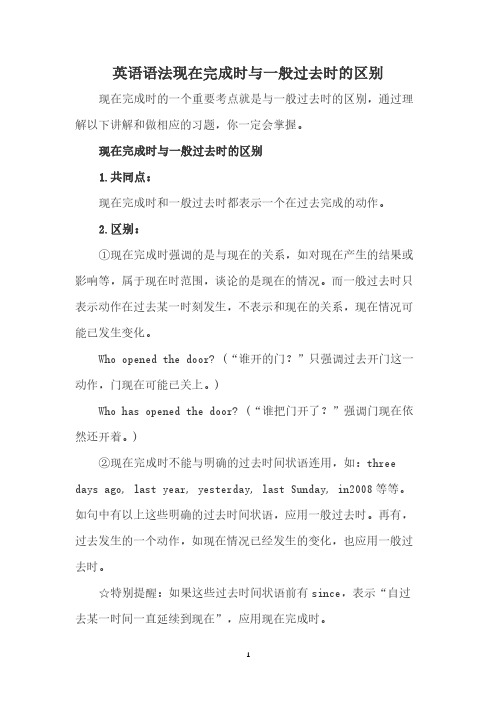
英语语法现在完成时与一般过去时的区别现在完成时的一个重要考点就是与一般过去时的区别,通过理解以下讲解和做相应的习题,你一定会掌握。
现在完成时与一般过去时的区别1.共同点:现在完成时和一般过去时都表示一个在过去完成的动作。
2.区别:①现在完成时强调的是与现在的关系,如对现在产生的结果或影响等,属于现在时范围,谈论的是现在的情况。
而一般过去时只表示动作在过去某一时刻发生,不表示和现在的关系,现在情况可能已发生变化。
Who opened the door? (“谁开的门?”只强调过去开门这一动作,门现在可能已关上。
)Who has opened the door? (“谁把门开了?”强调门现在依然还开着。
)②现在完成时不能与明确的过去时间状语连用,如:three days ago, last year, yesterday, last Sunday, in2008等等。
如句中有以上这些明确的过去时间状语,应用一般过去时。
再有,过去发生的一个动作,如现在情况已经发生的变化,也应用一般过去时。
☆特别提醒:如果这些过去时间状语前有since,表示“自过去某一时间一直延续到现在”,应用现在完成时。
He finished reading the book the day before yesterday.I put my ruler in my pencil-box, but I can’t find it now.My cousin has been in Nanjing since 2009.③现在完成时不与when引导的特殊疑问句连用,when后只用一般过去时表示已发生的动作。
但现在完成时可与where, why等疑问词连用。
如:Where have you been? (你去过哪里了?) --The train has left.--When did the train leave?④since引导的时间状语从句后面用一般过去时,只有前面的主句才用现在完成时。
五种时态一般现在时的_一般过去式_现在进行_现在完成时_一般将来时
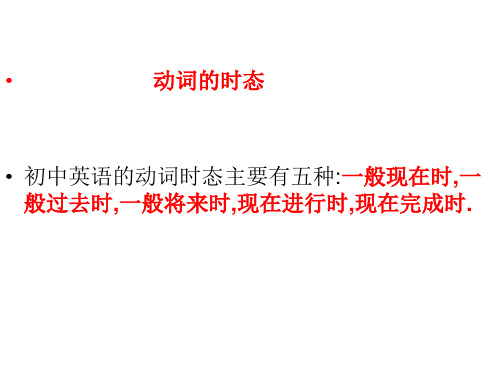
• • • • • • • • • • • • • • • • • • • • • • • • • • •
( ) 19. The day after tomorrow they ________ a volleyball match. A. will watching B. watches C. is watching D. is going to watch ( ) 20. There ________ a birthday party this Sunday. A. shall be B. will be C. shall going to be D. will going to be ( ) 21. They ________ an English evening next Sunday. A. are having B. are going to have C. will having D. is going to have ( ) 22. ________ you ________ free next Sunday? A. Will; are B. Will; be C. Do; be D. Are; be ( ) 23. He ________ there at ten tomorrow morning. A. will B. is C. will be D. be ( ) 24. ________ your brother ________ a magazine from the library? A. Are; going to borrow B. Is; going to borrow C. Will; borrows D. Are; going to borrows ( ) 25. – Shall I come again tomorrow afternoon? –________ (好的). A. Yes, please B. Yes, you will. C. No, please. D. No, you won’t. ( ) 26. It ________ the year of the horse next year. A. is going to be B. is going to C. will be D. will is ( ) 27. ________ open the window? A. Will you please B. Please will you C. You please D. Do you
【初中英语】现在完成时与一般过去时
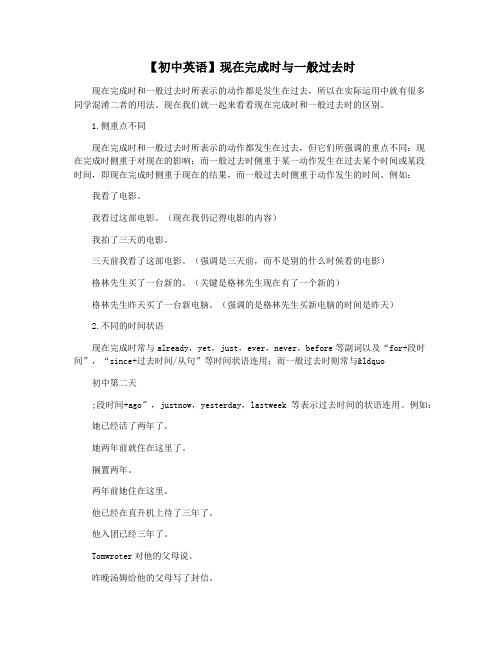
【初中英语】现在完成时与一般过去时现在完成时和一般过去时所表示的动作都是发生在过去,所以在实际运用中就有很多同学混淆二者的用法。
现在我们就一起来看看现在完成时和一般过去时的区别。
1.侧重点不同现在完成时和一般过去时所表示的动作都发生在过去,但它们所强调的重点不同:现在完成时侧重于对现在的影响;而一般过去时侧重于某一动作发生在过去某个时间或某段时间,即现在完成时侧重于现在的结果,而一般过去时侧重于动作发生的时间。
例如:我看了电影。
我看过这部电影。
(现在我仍记得电影的内容)我拍了三天的电影。
三天前我看了这部电影。
(强调是三天前,而不是别的什么时候看的电影)格林先生买了一台新的。
(关键是格林先生现在有了一个新的)格林先生昨天买了一台新电脑。
(强调的是格林先生买新电脑的时间是昨天)2.不同的时间状语现在完成时常与already,yet,just,ever,never,before等副词以及“for+段时间”,“since+过去时间/从句”等时间状语连用;而一般过去时则常与&ldquo初中第二天;段时间+ago”,justnow,yesterday,lastweek等表示过去时间的状语连用。
例如:她已经活了两年了。
她两年前就住在这里了。
搁置两年。
两年前她住在这里。
他已经在直升机上待了三年了。
他入团已经三年了。
Tomwroter对他的父母说。
昨晚汤姆给他的父母写了封信。
[实战演练]1.-ihaveseenthefilm“titanic”already.-你什么时候开始-thedaybeforeyesterday.a、有;看。
威尔;见。
种子。
看见;看见2.mrblack__________inchinasincefiveyearsago.a、 livedb。
haslivedc。
现场直播。
我要活了3.we____________treeslastsunday.sofarwe__________over3,000treesthere.a、种植的;种植的。
一般过去式,现在完成时区别

1、现在完成时的定义:现在完成时通常是指过去某一动作对现在的影响或过去某一动作持续到现在(可能要继续下去)2、现在完成时的构成:现在完成时是由“助动词have/has+过去分词”构成的3、现在完成时的用法:(1) 表示从过去到现在曾经经历过或做过的事情(2) 表示过去发生的动作对现在所产生的影响(3) 表示从过去某时开始的动作,状态一直持续到现在一般过去时也译为单纯过去时。
例A:He worked very hard last year.(去年他很用功。
)例B:Mr. Smith bought a new car yesterday.(史密斯先生昨天买了一辆新车。
)例C:They were here only a few minutes ago.(几分钟前他们还在这里。
)一、一般过去时的用法:解说:一般过去时最明显的现象就是常由表达过去之时间的副词或副词短语来修饰它(如各例句的斜体字部分)。
这些常用于修饰一般过去时的副词有:yesterday, yesterday morning (afternoon, evening ), just now (刚才), before (以前) , then (at that time )(当时) , last +时间(如 last week, month, year, Monday, … January, … spring, …, etc. ), that +时间(如 that day, afternoon, summer, …, etc. ), 时间 + ago (如a few minutes ago, two weeks ago , years ago, … etc.)二、一般过去时的主要语法功能:1. 表示过去发生的动作或情况,e.g. He returned home very late last night. 他昨晚很晚回家。
He turned off TV at midnight. 他午夜才关了电视。
一般过去式与现在完成时的区别
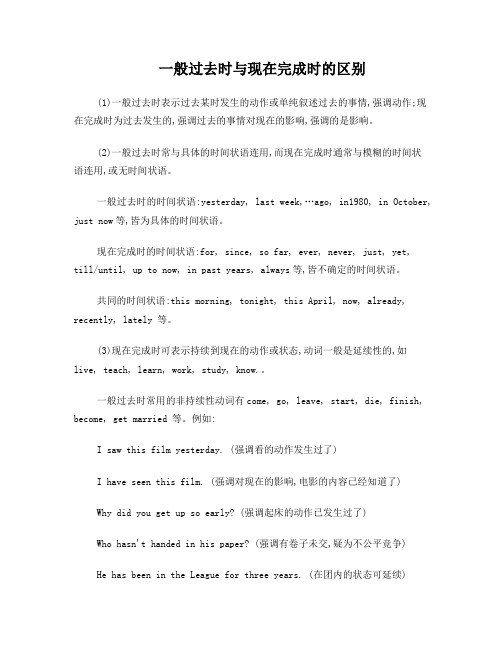
一般过去时与现在完成时的区别(1)一般过去时表示过去某时发生的动作或单纯叙述过去的事情,强调动作;现在完成时为过去发生的,强调过去的事情对现在的影响,强调的是影响。
(2)一般过去时常与具体的时间状语连用,而现在完成时通常与模糊的时间状语连用,或无时间状语。
一般过去时的时间状语:yesterday, last week,…ago, in1980, in October, just now等,皆为具体的时间状语。
现在完成时的时间状语:for, since, so far, ever, never, just, yet,till/until, up to now, in past years, always等,皆不确定的时间状语。
共同的时间状语:this morning, tonight, this April, now, already, recently, lately 等。
(3)现在完成时可表示持续到现在的动作或状态,动词一般是延续性的,如live, teach, learn, work, study, know.。
一般过去时常用的非持续性动词有come, go, leave, start, die, finish, become, get married 等。
例如:I saw this film yesterday. (强调看的动作发生过了)I have seen this film. (强调对现在的影响,电影的内容已经知道了)Why did you get up so early? (强调起床的动作已发生过了)Who hasn't handed in his paper? (强调有卷子未交,疑为不公平竞争)He has been in the League for three years. (在团内的状态可延续)He has been a League member for three years. (是团员的状态可持续)句子中如有过去时的时间副词(如yesterday, last, week, in 1960)时,不能使用现在完成时,要用过去时。
九年级英语复习一般过去时和现在完成时人教朗文版知识精讲
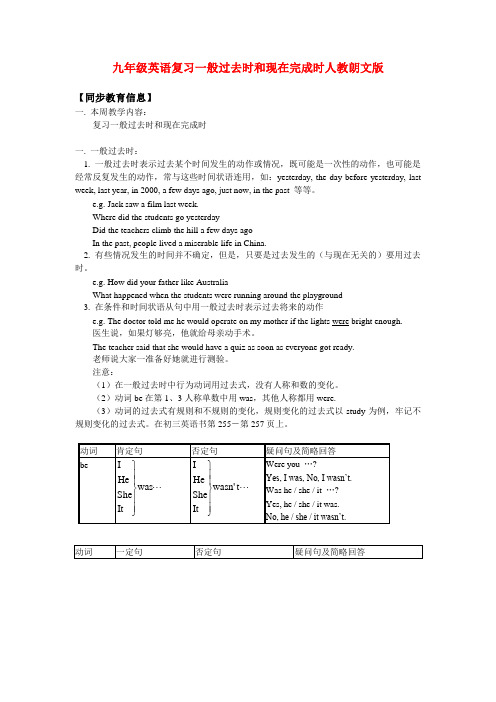
九年级英语复习一般过去时和现在完成时人教朗文版【同步教育信息】一. 本周教学内容:复习一般过去时和现在完成时一. 一般过去时:1. 一般过去时表示过去某个时间发生的动作或情况,既可能是一次性的动作,也可能是经常反复发生的动作,常与这些时间状语连用,如:yesterday, the day before yesterday, last week, last year, in 2000, a few days ago, just now, in the past 等等。
e.g. Jack saw a film last week.Where did the students go yesterdayDid the teachers climb the hill a few days agoIn the past, people lived a miserable life in China.2. 有些情况发生的时间并不确定,但是,只要是过去发生的(与现在无关的)要用过去时。
e.g. How did your father like AustraliaWhat happened when the students were running around the playground3. 在条件和时间状语从句中用一般过去时表示过去将来的动作e.g. The doctor told me he would operate on my mother if the lights were bright enough.医生说,如果灯够亮,他就给母亲动手术。
The teacher said that she would have a quiz as soon as everyone got ready.老师说大家一准备好她就进行测验。
注意:(1)在一般过去时中行为动词用过去式,没有人称和数的变化。
(2)动词be在第1、3人称单数中用was,其他人称都用were.(3)动词的过去式有规则和不规则的变化,规则变化的过去式以study为例,牢记不规则变化的过去式。
初中英语六大时态

初中英语六大时态一.一般现在时二.一般过去时三.一般将来时四.现在进行时五.过去进行时六.现在完成时一、一般现在时1.表示现阶段经常性、习惯性的动作或存在的状态,特征;常用时间状语:always (总是) usually (常常) often (经常) sometimes (有时) seldom (很少,少到可忽略不计) never (从不) every day (每天)/week (每周),等「注:seldom 与never 都是否定用法」例句:I always go to school by bus in order to get to the class on time.为了准时去上课,我总是坐公交车上学 He seldom does his homework which make his teacher so mad.他几乎不做作业,这让他的老师非常恼火(※注:主语为第三人称时动词的变化 go →goes )2.在时间状语和条件状语从句中,用一般现在时表将来例句:If you don ’t harry up,you will be late !time 2 1 3如果你不快一点就要迟到啦!You mustn’t eat any thing until you go to hospital.你不能吃任何东西直到你去看医生后「※注:其实就是“主将从现”」3.表示客观真理和事实的时候用一般现在时例句:The sun rises in the east.太阳从东边升起The earth moved around the sun.地球围着太阳转4.begin、come、go、leave、start、arrive等动词常用一般现在时表示按规定按计划将要发生的动作例句:Class begins at 8 in the morning.8点开始上课二、一般过去时1.一般过去时表示过去某时间发生的动作、存在的状态或过去反复发生的动作。
英语语法-现在完成时与一般过去时的区别(附习题)

英语语法| 现在完成时与一般过去时的区别(附习题)共同点:现在完成时和一般过去时都表示一个在过去完成的动作。
区别:①现在完成时强调的是与现在的关系,如对现在产生的结果或影响等,属于现在时范围,谈论的是现在的情况。
而一般过去时只表示动作在过去某一时刻发生,不表示和现在的关系,现在情况可能已发生变化。
Who opened the door?“谁开的门?”(只强调过去开门这一动作,门现在可能已关上。
)Who has opened the door?“谁把门开了?”(强调门现在依然还开着。
)②现在完成时不能与明确的过去时间状语连用,如:three days ago, last year, yesterday, last Sunday, in 2008等等。
如句中有以上这些明确的过去时间状语,应用一般过去时。
再有,过去发生的一个动作,如现在情况已经发生的变化,也应用一般过去时。
特别提醒:如果这些过去时间状语前有since,表示“自过去某一时间一直延续到现在”,应用现在完成时。
He finished reading the book the day before yesterday.他前天读完了这本书。
I put my ruler in my pencil-box, but I can’t find it now.我把尺子放到文具盒里了,但是我现在找不它了。
My cousin has been in Nanjing since 2009.我的表弟从2009年起就呆在南京了。
③现在完成时不与when引导的特殊疑问句连用,when后只用一般过去时表示已发生的动作。
但现在完成时可与where, why等疑问词连用。
如:Where have you been?你去过哪里了?—The train has left.—When did the train leave?——火车已经驶离了。
——火车什么时候驶离的?④since引导的时间状语从句后面用一般过去时,只有前面的主句才用现在完成时。
现在完成时和一般过去时
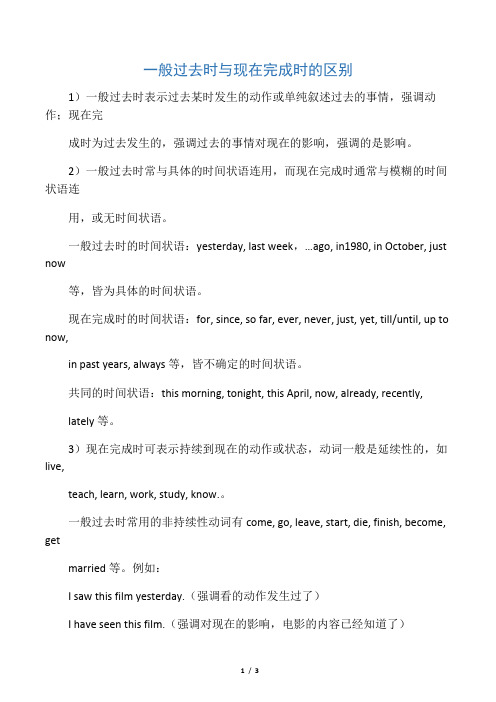
一般过去时与现在完成时的区别1)一般过去时表示过去某时发生的动作或单纯叙述过去的事情,强调动作;现在完成时为过去发生的,强调过去的事情对现在的影响,强调的是影响。
2)一般过去时常与具体的时间状语连用,而现在完成时通常与模糊的时间状语连用,或无时间状语。
一般过去时的时间状语:yesterday, last week,…ago, in1980, in October, just now等,皆为具体的时间状语。
现在完成时的时间状语:for, since, so far, ever, never, just, yet, till/until, up to now,in past years, always等,皆不确定的时间状语。
共同的时间状语:this morning, tonight, this April, now, already, recently,lately等。
3)现在完成时可表示持续到现在的动作或状态,动词一般是延续性的,如live,teach, learn, work, study, know.。
一般过去时常用的非持续性动词有come, go, leave, start, die, finish, become, getmarried等。
例如:I saw this film yesterday.(强调看的动作发生过了)I have seen this film.(强调对现在的影响,电影的内容已经知道了)Why did you get up so early?(强调起床的动作已发生过了)Who hasn't handed in his paper?(强调有卷子未交,疑为不公平竞争)He has been in the League for three years.(在团内的状态可延续)He has been a League member for three years.(是团员的状态可持续)句子中如有过去时的时间副词(如yesterday, last, week, in 1960)时,不能使用现在完成时,要用过去时。
新译林版英语八年级上册一般过去时和现在完成时的区别

A hasn't B has
C doesn't D does
( C ) 6 、----Where is Tom? I can’t find him anywhere.
----He ______ back for a holiday.
A. went B. goes C. has gone D. will go
A How soon B How often C How much D How long
( C ) 4 、He's _________back home since 3 days ago.
A come B got
C been
D get
( D ) 5、 He never has lunch at home , _____he ?
四、学习现在完成时应注意的三个区别。
1)延续性动词与短暂性动词的区别。
2)since 和 for 的区别。
3)have / has gone to 、 have / has been to 、have / has been in 的区别。
五、短暂性动词和延续性动词转换归纳。
buy—have
leave— been away from
He has lived here since he was born .自他出生 以来一直居住在这儿。(since 自从…以来与 现在有关,说明还居住在这儿。)
Liumei went to see her grandmother last night . 刘 梅昨晚去看了他外婆。(只说明昨晚)
(三)值得注意几个问题:
---- Ever since twenty-five minutes ago.
初中英语八种时态讲解

时态
一般现在时 一般过去时 现在进行时 过去进行时 现在完成时 过去完成时 一般将来时 过去将来时
一般现在时
一、一般现在时:
概念:经常、反复发生的动作或行为及现 在的某种状况。 时间状语: always, usually, often, sometimes, every week (day, year, month…), once a week, on Sundays, etc. 基本结构:①be动词;②行为动词 否定形式:①am/is/are+not;②此时态的谓 语动词若为行为动词,则在其前加don't,如 主语为第三人称单数,则用doesn't,同时 还原行为动词。 一般疑问句:①把be动词放于句首;②用 助动词do提问,如主语为第三人称单数, 则用does,同时,还原行为动词。
10. I will go there when I _____(have, will have, has) time tomorrow. 11. He won’t come to the party unless he _____(be, will be, am, is, are) invited. 12. I’ll wait here until my mother ____(come, comes, will come) back. 13. Please return the book to the library as soon as you ______(finish, finishes, will finish) reading it. 14. Once you _____(see, sees, will see) him, you will never forget him.
初中英语语法八大时态总结

1.一般现在时2 .一般过去时3 .一般将来时4 .现在进行时5 .过去进行时6 .现在完成时7 .过去完成时8 .过去将来时1.一般现在时1.一般现在时的构成一般现在时主要用动词原形表示,如果主语是第三人称单数则动词也要用第三人称单数形式。
动词第三人称单数的构成方式如下:构成方法例词一般在词尾加-s work—works;spend—spends在以s,z,ch,sh,x等字母结尾的动词之后加-es pass—passes;wash—washes;teach—teaches;mix—mixes以不发音的e结尾的动词只在e后加-s write—writes;ride—rides 以“辅音字母+y”结尾的动词,变y为i,再加-esstudy—studies;try—tries 以o结尾的动词,在词尾加-es do—does;go—goes2.一般现在时的用法(1)表示经常性或习惯性的动作或存在的状态,常与often,always,usually,sometimes,once a week,every day/...等表示频率的副词或时间状语连用。
如:I often go to school by bike.我经常骑车去上学。
(2)表示客观事实或普遍真理。
如:The earth goes around the sun.地球绕着太阳转。
(3)在时间、条件等状语从句中,用一般现在时表示将来。
如:If it rains tomorrow,we won't go to the park.如果明天下雨,我们将不去公园。
When I grow up,I will go to America.当我长大后,我将去美国。
即学即练( )1.If Nancy ________ the exam ,she will go to Australia for English study.A .passB .passedC .passesD .will pass ( )2.The Greens will visit Hainan as soon as they ________ to China.A .comesB .comeC .cameD .will come ( )3.Now my father ________ his bike to work every day instead of driv ing.A .rideB .rodeC .ridesD .will rideC B C2.一般过去时1.一般过去时的构成一般过去时用动词的过去式表示,即:主语+动词的过去式。
精讲初中五种时态一般现在时的,一般过去式,现在进行,现在完成时,一般将来时

动词的时态
• 初中英语的动词时态主要有五种:一般现在时,一 般过去时,一般将来时,现在进行时,现在完成时.
• 1. 一般现在时:
• 构成:主要由动词原形表示,但在第三人称单数时要在 词尾加-s 。否定句和疑问句要用助动词do, does. • 一般现在时 的标志性时间: every( year,otherday ,twodays,week,month…) ,often , always,usually ,sometimes, in the morning,in summer,on Sunday • 用法3种情况 A. 经常性或习惯性的动作。如The trees get green in spring . 。 B现在特征或状态。如The Changjiang River is the longest in our country. He doesn` t work in the factory . C.普遍真理。如The sun rises in the east . Five and two in seven .
• 二、用所给单词的正确形式填空填空: • 1. My father always __________(come) back from work very late. • 2. The teacher is busy. He __________ (sleep) six hours a day. • 3. Listen! Joan __________(sing) in the classroom. She often __________ (sing) there. • 4. __________ your brother __________(know) Japanese? • 5. Where __________ you __________ (have) lunch every day? • • 6. The girl __________(like) wearing a skirt. Look! She __________(wear) a red skirt today. • 7. My parents _______(watch)TV now. 8. Look. Three boys _______(run). 9. What _______ your mother _______(do)now? 10. _______ your dog _______ now?(sleep) • 11. _______ you _______(listen)to music? Yes, I am. 12. Look, Miss Chen _______ (play)football. 13. Tom and his sister _______(wait)for you over there. 14. Now Class 3 and Class 4_______(have)a test. 15. Listen, someone _______(sing)in the classroom. 16. ——Where is Zhang Yan? ——She _______(talk)with her teacher in the teacher’s office.
- 1、下载文档前请自行甄别文档内容的完整性,平台不提供额外的编辑、内容补充、找答案等附加服务。
- 2、"仅部分预览"的文档,不可在线预览部分如存在完整性等问题,可反馈申请退款(可完整预览的文档不适用该条件!)。
- 3、如文档侵犯您的权益,请联系客服反馈,我们会尽快为您处理(人工客服工作时间:9:00-18:30)。
How many times have you been there this year?
今年你去过那里多少次?
(2)现在完成时可以和带有since或for等表示“一段时间”的状语连用,表示动作或状态从某一时刻开始,一直持续到现在。如:I haven't seen him for two years.但是,像come,arrive,buy等终止性动词不能与表示“一段时间”的状语连用。要用,必须改为“be(在)”等延续性动词来表述。现归纳总结一下由非延续性动词到延续性动词的转换:
I lived here for a week last summer.去年夏天我在这里住了一周。
I have lived here for a week by now.到现在为止,我已经在这里住了一周。
I will live here for a week next year.明年我会在这里住一周。
-I have never been to the Great Wall.我从未去过长城。
c.用表示到说话为止的过去时间状语,如just, before, up to now, the past few years等。
例如:I have seen her before, but I can not remember where.
4.几点注意事项
(1)have been(to)与have gone( to)的区别:have been(to)表示“去过某地(现在已经回来了)”,可用于各人称;have gone(to)表示“去某地了(说话时某人不在当地)”,常用于第三人称,前者可与once ,never, several times等连用,后者则不能。如:They have been to Beijing twice.他们去过北京两次。
Exercise
练习题
1. A.用already或yet
1) Have they taken down the old pictures ___yet___? No, not ___haven’t_____.
2) Most of us have finished our compositions _____阿拉ready___
I have seen this film.(强调对现在的影响,电影的内容已经知道了)
Why did you get up so early?(强调起床的动作已发生过了。)
Who hasn't handed in his paper?(强调有卷子,可能为不公平竞争。)
She has returned from Paris.她已从巴黎回来了。
如:He has been a soldier for three years.他参军三年了。
His father has been dead for two years.他父亲去世二年了。
The film has been on for ten minutes.电影已开始十分钟了。
We have studied English for three years.我们(开始)学英语已三年了。
他自1981年就在这儿教书。(可能还要继续教)
I haven't seen her for four years.
我有四年没见到她了。
(3)表示说话前发生过一次或多次的动作,现在成为一种经验,一般译为汉语“过”,常带有twice,ever,
never,three times等时间状语。
如:I have been to Beijing twice.我去过北京二次。
We are good friends.(现在的情况)
I knew him in 1997.(过去的动作)
We have known each other since 1997.
(现在完成时把过去的动作和现在联系起来并着眼于现在)
(1)表示动Biblioteka 发生在过去某个不确定的时间,但对现在留下了某种影响和结果。常被just、already、yet等副词修饰。如:
(3)终止性动词现在完成时的否定式,已变成一种可以延续的状态,因此可以和表示一段时间的状语连用。
如:I haven't left here since 1997.自从1997年以来,我一直没有离开过这儿
(4)表示行为或状态从过去一直持续到现在时,用现在完成时,要加表示一段时间的时间状语时,常用for+一段时间, since+时间点。
如:We have already finished our homework.我们已完成作业了。
They haven't finished their homework yet.他们还没有完成作业。
b.用ever和never。多用于否定或疑问句中,表示“曾经”或“从未“等。
如:-Have you ever been to the Great Wall?你曾经去过长城吗?
3.现在完成时的时间状语
(1)现在完成时属于现在时范围,故不能和过去的时间状语连用。如:yesterday,last Sunday,in1990,three years ago等。但是,在强调动作产生的后果和影响时,可以和一些表示不确定的时间状语连用。
a.用副词already和yet。already一般用于肯定句中,yet一般用于否定句和疑问句中。
-Have you had lunch yet?
-Yes, I have. I've just had it.
你(已经)吃午饭了吗?我刚刚吃过。(现在我不饿了)
(2)表示从过去某一时刻开始一直持续到现在的动作或状态。这个动作可能刚停止,可能仍然在进行。常带有for和since等表示一段时间的状语。
如:He has taught here since 1981
open→be openjoin→be in或be a member of…
close→be closedgo to school→be a student
borrow→keepbuy→have
catch(a cold)→ have(a cold)get to know →know
begin to study→studycome to work→work等
3) He asked me if I_____ to Hangzhou before.
I told him that I wanted to go there for a visit as I ____ never ____ to that city before.
He has gone to Beijing .他去北京了。
(2)如单纯表示一段时间,或强调一段时间,虽有since一词,也不必用完成时。
如:It is two years since his father died.
=His father has been dead for two years.他父亲去世已有两年了。
共同的时间状语:
this morning, tonight, this April, now, once,before, already, recently,lately
现在完成时的时间状语
for, since, so far, ever, never, just, yet, till / until, up to now, in past years, always,
3) I have stayed at my aunt’s _____two weeks.
C.用have gone或have been
1) Where are the boy students ? They _____ to the school factory.
2) Is your father in ? No, he ____ to Shenzhen. _______he ever ______ there before ? Yes, he ___ there several times
一般过去时与现在完成时区别专题
现在完成时
1.现在完成时的构成
现在完成时是由助动词have (has)+动词的过去分词构成。助动词说明该谓语是属于现在时范围。它和主语的人称、数要保持一致。过去分词是主要的谓语动词,说明句子的意义。
2.现在完成时的用法
现在完成时表示过去某时发生的行为对主语目前产生的影响。即用过去发生的某个行为来说明现在的某种情况。
3.现在完成时可表示持续到现在的动作或状态,动词一般是延续性的,如live, teach, learn, work, study, know.
过去时常用的非持续性动词有come, go, leave, start, die, finish, become, get married等。
举例:
I saw this film yesterday.(强调看的动作发生过了。)
3) He said he hadn’t visited the exhibition _____yet___.
B.用since或for
1) We have learned five lessons __since____ the beginning of this term.
2) Mrs Liao has been in hospital ___since___last week.
句子中如有过去时的时间副词(如yesterday, last, week, in 1960)时,不能使用现在完成时,要用过去时。
(错)Tom has written a letter to his parents last night.
(对)Tom wrote a letter to his parents last night.
